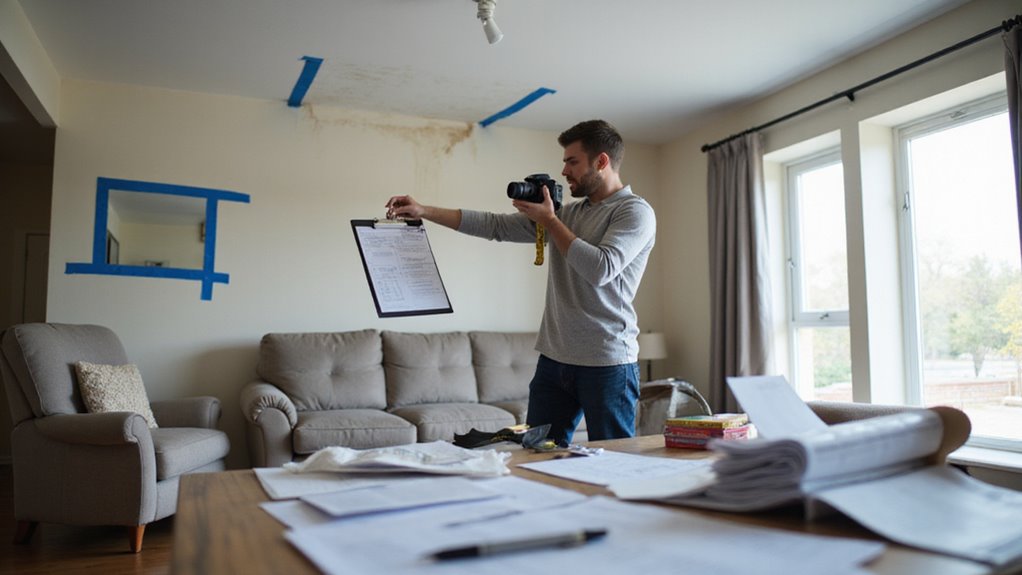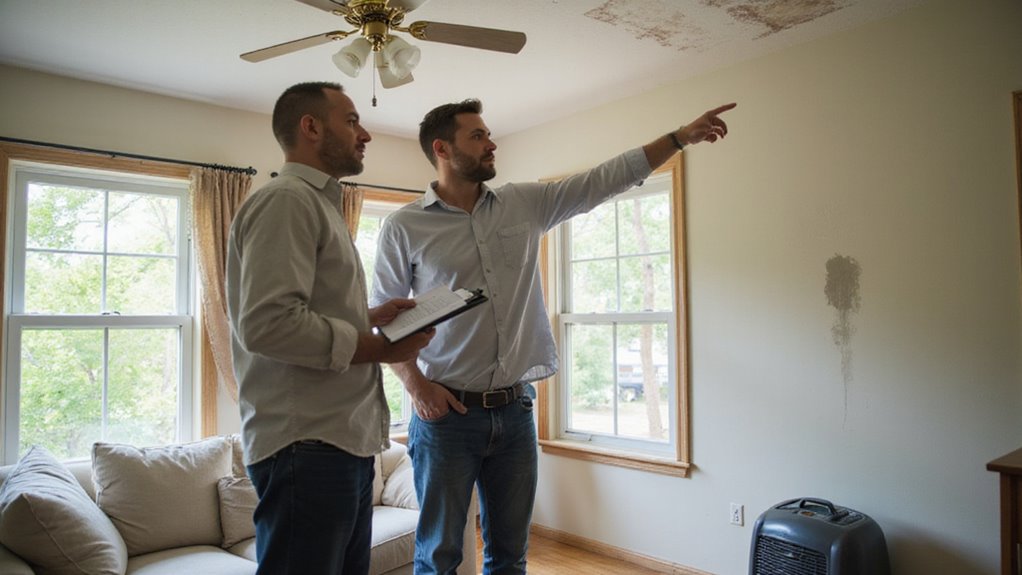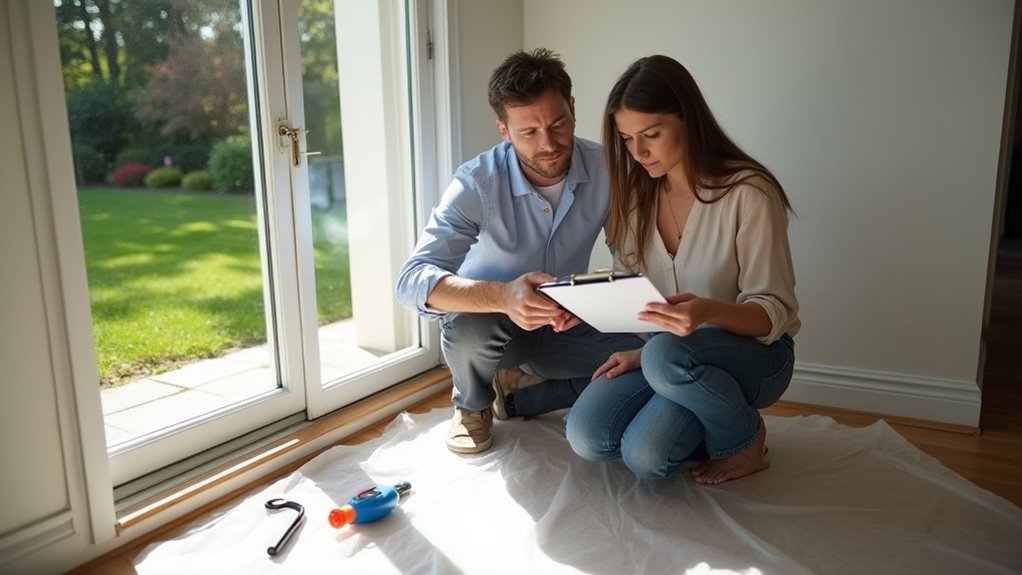Selling a house with water damage can be complicated. Many homeowners worry about what they need to tell buyers. Missing important details can create serious legal trouble.
If you hide or forget to disclose water issues, you risk lawsuits or losing the sale. Buyers may also demand costly repairs after discovering hidden damage.
This can lead to stress and financial loss. You must honestly disclose any known water damage, repairs, and insurance claims to potential buyers.
Following the law protects you from legal action and helps you build trust with buyers. Clear disclosure ensures a smoother sale.
This blog will guide you through your legal responsibilities and help you avoid problems when selling a house with water damage.
Key Takeaways
- Sellers are legally required to disclose any known past or present water damage to potential buyers.
- Accurate documentation of damage, repairs, and insurance claims must be provided and organized before listing the property.
- Failure to disclose water damage can result in lawsuits, sale cancellation, or financial penalties.
- Real estate agents assist with compliance by ensuring disclosure forms are completed according to local and state laws.
- Buyers have the right to inspect for hidden water damage and negotiate repairs or contract terms based on disclosed information.
Understanding Water Damage and Its Impact on Property Value

Water damage lowers a property’s value and weakens its structure. Buyers often pay less or lose interest in damaged homes. If you want to sell, you must understand how water damage affects value.
Water damage comes in different categories, based on how dirty the water is and how far it spreads. Clean water causes less harm, while dirty or black water is more dangerous. Each type can hurt the building in different ways. When selling as-is, be aware that buyers may demand larger discounts to offset the risks and repair costs related to water damage.
Moisture can damage walls, floors, and even the foundation. If damage is hidden, mold may grow and cause bigger problems. You might lose money if you don’t spot and fix all water damage.
Properly finding and describing water damage helps you repair it correctly. If you do this, you can be honest with buyers and meet legal rules. Accurate information helps protect your property’s value when selling. In Virginia, sellers must provide honest disclosure forms to buyers about any known water damage, similar to the requirements for pest or termite issues.
Common Causes of Water Damage in Homes
When you’re evaluating your home for water damage, pay close attention to leaky roofs and ceilings, as these often let moisture seep into the structure unnoticed. Plumbing and pipe failures are another major culprit, frequently resulting in hidden leaks behind walls or under floors.
Addressing these issues promptly is crucial, as well-maintained homes are more likely to sell faster by attracting buyers and reducing the risk of negotiations falling through due to surprise repairs. Identifying these sources early helps you address issues before they intensify and become costly liabilities during a sale.
It’s important to remember that concealed water or mold issues must be disclosed by law in Virginia, as failure to do so can lead to legal action or penalties for the seller.
Leaky Roofs and Ceilings
Leaky roofs and ceilings are common causes of water damage in homes. Water often gets in when the roof has damaged or missing parts. Signs include ceiling stains, paint bubbles, or sagging drywall.
A roof can start leaking if it is old, damaged by storms, or installed poorly. Clogged gutters or cracked flashing can let water through. If leaks are ignored, wood can rot and mold may grow.
You should fix roof and ceiling leaks quickly to prevent bigger problems. Addressing leaks right away helps keep your home safe. If you plan to sell, you must tell buyers about any water damage.
Plumbing and Pipe Failures
Plumbing and pipe failures can cause water damage in your home. Old or faulty pipes increase the risk of leaks and structural problems. Leaks often happen behind walls or under floors, making them hard to find.
Common causes include worn-out pipes, bad repairs, or poor connections. If you see corrosion or damp spots, check your pipes right away. Mold, wood rot, and foundation damage may occur if leaks are not fixed quickly.
Regular inspection of visible pipes helps prevent serious issues. If you find a plumbing problem, repair it as soon as possible. When selling your home, you must tell buyers about any water damage from leaks, or you may face legal trouble.
State and Local Disclosure Laws Explained

State and local governments have their own rules for disclosing real estate issues. You must know your area’s laws before selling a house with water damage. Each place may ask for different details about water problems. When preparing a property for sale, it may also be helpful to maximize natural light and present the home in its best condition to appeal to buyers.
Some states need written disclosure forms, while others allow verbal disclosures. Most places will penalize sellers who do not give complete and accurate information. You should ask your local real estate board or a lawyer to understand your exact duties.
If you have made insurance claims or fixed water damage, keep all records. These documents may be required by state or local law. Failure to comply can lead to legal or financial trouble after the sale.
It is also essential to understand disclosure requirements specific to your state, as strict laws often require you to inform buyers about safety concerns and unresolved issues related to previous damage.
What Sellers Are Legally Required to Disclose
Sellers must legally tell buyers about any water damage in the house. This includes both past and current damage. If you do not disclose this, you could face legal trouble.
The law also requires sellers to share if they made insurance claims for water damage. Even if repairs were made, you still need to report the problem. Buyers have the right to know about any issue that could change their decision. Failing to provide these details can also affect insurance challenges and may result in disputes or loss of coverage for new homeowners.
If you are unsure about what to disclose, it is safer to share more information. Honest disclosures help protect sellers from lawsuits. Always give complete and clear details to meet your legal duties. In addition, understanding the importance of clear title is crucial, as unresolved issues—like liens or undisclosed water damage—can delay or prevent a successful home sale.
How to Properly Document Water Damage

To protect yourself legally, you need to document water damage with clear, dated photographs of all affected areas. Gather and organize any repair invoices, inspection reports, or professional assessments related to the issue. Maintain a detailed timeline of when you uncover the problem, took corrective action, and completed repairs.
Keeping comprehensive records, including valuation documents, is crucial for demonstrating transparency and legal compliance during the sales process. When organizing your documentation, be sure to use digital archiving methods to ensure all files are secure and easily accessible.
Photographing Impacted Areas Thoroughly
Photographing every area affected by water damage is important for accurate records and legal protection. Take wide shots of each damaged room first. Then, capture close-up photos to show details like stains or mold.
Remember to check hidden spots, such as closets, behind furniture, and under sinks. If you see possible outside damage, include photos of landscaping and the home’s foundation. These images help show where water might have entered.
All photos should be clear, well-lit, and have timestamps. Never hide damage when taking pictures; honesty is necessary for legal reasons. Good records can help you in case of any future disputes or questions from buyers.
Compiling Repair and Inspection Reports
You should gather all repair and inspection documents before listing your home. This includes invoices, inspection reports, and service records about the water damage. These papers show what repairs were done and who did them.
If you hired licensed contractors, keep their reports and any notes from specialists. Insurance claim records are also important, as they show how you handled the damage and any money received. You should add mold remediation reports and clearance certificates if you used these services.
Receipts for equipment rentals or materials used in repairs should be included. Organize everything by date so nothing is missed. If you do this, you will meet disclosure rules and buyers will see that you fixed the problem responsibly.
Recording Timeline of Events
A timeline of events helps show what happened when water damage occurs. It gives clear proof for buyers and insurance companies. If you keep good records, it is easier to explain the situation.
Start by noting the date you found the water damage. Add photos and short written notes to describe what you saw. If you act quickly, write down the steps you took, such as calling a repair service or using fans.
Keep all receipts and notes about the repair process. Save every report from inspectors or contractors. If you file an insurance claim, write down when you contacted your provider and what they said.
Record every conversation with professionals and your insurance company. If you receive any payments or settlement offers, note the dates and amounts. A clear timeline shows you handled the problem responsibly.
The Role of Real Estate Agents in Disclosure

Real estate agents help make sure you tell buyers about any water damage in your home. They are required to guide you in listing all known problems, both old and new. If you do not disclose water issues, you could face legal trouble. Agents also provide guidance regarding Virginia property laws that relate to proper disclosure and seller responsibility.
Agents help you fill out disclosure forms with clear and correct information. They make sure you mention any insurance claims or repairs related to water damage. If professional mold cleanup was done, agents will help you include those details.
Agents also help you collect documents to support your statements. If you are unsure what to include, they can offer advice. This process protects both you and the buyer and helps the sale go smoothly.
Your agent may also recommend professional photography to ensure your home’s best features are showcased and help attract more buyers for a faster, smoother transaction.
Potential Consequences of Failing to Disclose Water Damage
If you do not tell buyers about water damage, you could face legal and financial problems. Buyers might sue if they find water issues after buying your house. Courts may make you pay for repairs or even cancel the sale. By not properly disclosing issues, you might also miss the opportunity to set a competitive price that reflects the home’s true condition and market value. Insurance companies might deny claims for undisclosed water damage. In that case, both you and the buyer may need to pay for repairs. Hidden water damage can also cause mold, which is expensive to fix.
Not sharing this information could harm your reputation. If you are a licensed real estate agent, you could lose your license or face fines. Some states may also take disciplinary action against you. Failing to disclose water damage may also complicate the title search process, increasing the chances of delays or disputes during the sale.
Steps to Take Before Listing a Damaged Property

Before listing a damaged property, you should prepare and be transparent about its condition. Start by clearly documenting all visible water damage. Take photos and write short descriptions of each problem area.
If you have repaired the damage before, gather receipts and contractor information. Insurance claim documents related to water damage should also be collected. Buyers may ask for these records during the sale.
A professional assessment can help you understand the full extent of the damage and repair costs. If your state requires certain disclosures, review those rules carefully. Organizing these details can protect you from legal issues and help make the sale process smoother. In Virginia, sellers must be aware of disclosure requirements for known defects including water damage, ensuring full transparency with potential buyers.
Working With Home Inspectors and Appraisers
When you work with home inspectors and appraisers, you must fully disclose any water damage and the steps you’ve taken to address it. Inspectors will document these findings, and appraisers will factor them into your property’s market value. Failing to communicate this information accurately can impact both your legal standing and the final sale price.
Disclosing Water Damage Findings
You must tell buyers about any water damage when selling your house. This includes damage that looks minor or has been repaired. Honest disclosure is required during inspections and appraisals.
Sellers need to show where the damage happened and what repairs were made. If you have receipts or reports, give copies to the buyer. Insurance claim documents should also be shared if you filed them.
Inspectors and appraisers will check for signs of past water damage. Clear records help avoid legal trouble and build trust with buyers. Full disclosure protects you from future claims and lets everyone make informed choices.
Impact on Property Valuation
Water damage can lower your property’s value. If you disclose past water issues, buyers and appraisers will factor them in. Hiding problems may lead to more price reductions later.
Home inspectors look for signs of water damage. They check how repairs were made and if any risks remain. If they find issues, buyers may ask for repairs or discounts.
Appraisers compare your home to others with and without water damage. They lower the value if repairs were not thorough. Well-documented restoration can help maintain your home’s worth.
Insurance claims for water damage can also affect value. A history of claims may worry buyers. If claims are unresolved, the property may be harder to sell.
Repair Versus Sell As-Is: Weighing Your Options
If your property has water damage, you must choose between repairing it or selling as-is. This decision affects your money and legal responsibilities. Repairs can increase your home’s value, but selling as-is may be faster.
Deciding to repair water damage or sell as-is impacts your finances, responsibilities, and how quickly you can move forward.
You should check how serious the damage is before deciding. Insurance may help pay for repairs if your policy covers water damage. If the repairs are too expensive or take too long, selling as-is could be better.
Selling as-is often means you will get lower offers from buyers. You must tell buyers about any water damage you know about. Not fixing or disclosing water damage could lead to legal problems.
Consider the cost of repairs and how much more you may earn by fixing the house. If repairs do not increase the value enough, selling as-is might make more sense. Always balance your possible profits with your time and risks.
Marketing a Home With Past or Present Water Issues
Marketing a home with water issues requires honesty and clear information. Buyers want proof that any water problems are fixed. Direct answers help them feel more comfortable.
The seller should share all past water incidents and repairs. If there were insurance claims, those details must be included. Maintenance records and repair documents show the owner took care of the problem.
If the home has new waterproofing or drainage systems, mention these improvements. Highlighting steps to prevent mold or future issues can increase buyer trust. Third-party inspection reports give buyers extra reassurance.
If you follow these steps, buyers may feel more confident. Clear communication can reduce concerns and help sell the home faster. Proper documentation is key for a successful sale.
Negotiating With Buyers When Water Damage Is Involved
Water damage can make negotiations with buyers more difficult. You should give buyers clear information about the damage and what you have done to fix it. If you are honest about the problem, buyers are more likely to trust you.
Buyers may ask for a lower price or money for future repairs. You should be ready to negotiate and show proof of repairs and mold removal. If you have not fixed everything, tell the buyer clearly.
You can offer to do more repairs or give a price discount. If you answer questions about water and mold problems quickly, negotiations will go better. Providing complete information helps avoid delays or losing the sale.
Legal Protections for Buyers and Sellers
Real estate deals can be risky when water damage is involved. Buyers and sellers each have legal protections to reduce this risk. These protections help avoid future disputes and financial problems.
Sellers must follow disclosure laws and share any known water damage with buyers. Buyers can get the property inspected for hidden water or mold problems. If damage is found after the sale and was not disclosed, buyers may get compensation or end the contract.
Both parties can add contract terms about water damage repairs or mold cleanup. These terms help define who is responsible for fixing any issues. If you have concerns, you should talk to a real estate lawyer.
Resources for Addressing Water Damage Before Selling
You need the right help to fix water damage before selling your house. Proper steps make sure you solve problems and follow the law. Good preparation also helps avoid issues after the sale.
A water damage restoration company can check and repair damaged areas. They will suggest ways to stop mold or future damage. Their work helps keep your home safe and strong.
If you have homeowners insurance, review your policy for coverage. You can file a claim to help pay for repairs. Insurance may cover some or all of the costs.
A real estate attorney can explain what you must tell buyers about water damage. They also guide you with legal rules and paperwork. This step helps you avoid legal trouble later.
Local health departments or building inspectors can check your repairs. They make sure your house meets safety standards. If you want extra peace of mind, use their services.
Using these resources can prepare your home for sale. You can fix issues and avoid future disputes. Proper steps keep the selling process smooth and safe.
Conclusion
If you plan to sell a house with water damage, you must understand your legal responsibilities. Sellers must disclose all known issues clearly. If you fail to do so, you could face legal problems after the sale.
If you want to sell quickly, we buy houses for cash, even with water damage. Sellers can avoid repairs and lengthy negotiations by choosing this option. You can move forward with confidence, knowing you met your obligations.
If you need help, we at Align Real Estate Solutions are here for you. Contact us today to get a fair, no-obligation cash offer. Let us make your selling process simple and stress-free.
Author
-

Zach Koops is co-founder and Real Estate Success Manager at Align Real Estate Solutions, serving homeowners across Virginia since 2024. With a passion for real estate and a heart for people, Zach has built his career around helping sellers navigate tough situations—foreclosure, inheritance, relocation, repair-overload—with clarity and compassion. He’s known for being straightforward, steady under pressure, and deeply invested in relationships. Outside of work, he spends his time as a husband and father, enjoys the outdoors in Shenandoah Valley, loves singing on stage, and constantly seeks growth through reading and new experiences.









